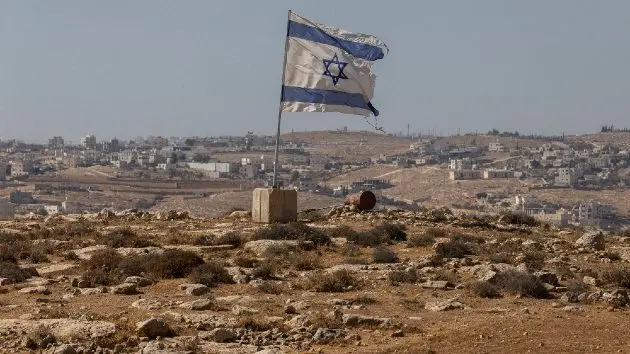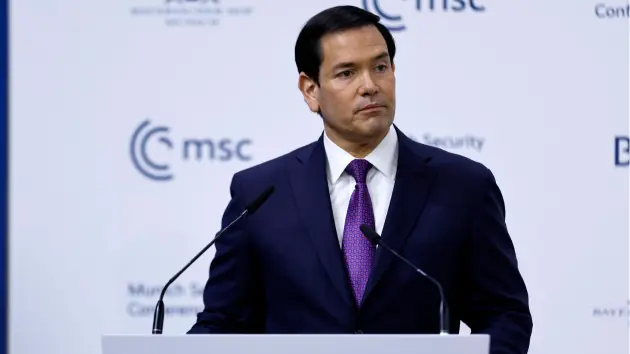
(LONDON) — A controversial Israeli settlement plan that would effectively split the West Bank in two is gaining momentum after a key government committee — the Higher Planning Committee of the Civil Administration under the Defense Ministry — gave its approval.
The settlement proposal approved by the Israel Defense Ministry on Wednesday consists of a plan to build 3,400 new housing units in an area known as E1 — an area of land some 4.6 square miles in size separating Jerusalem from the Israeli settlement of Maale Adumim.
The E1 area is particularly significant, given it is one of the last areas linking the West Bank Palestinian cities of Ramallah in the north and Bethlehem in the south. The construction of Israeli settlements there — which has been proposed for decades but until now not approved — is considered by supporters and critics alike as a major obstacle to the establishment of a Palestinian state.
Any new settlement construction is expected to restrict the movement of Palestinians in the area. Israeli authorities maintain tight restrictions on Palestinian entry into and movement inside illegal settlements, as reported by the United Nations and a host of foreign, Israeli and Palestinian human rights groups.
Bedouins – the descendants of historically semi-nomadic groups, many of whom now live in agricultural areas of the West Bank — currently living in the area said this week that they have already received orders to leave. Atallah Al-Jahelin, the representative of the Bedouin community of Jabal Al-Baba to the west of Maale Adumim, said locals there had received notice of planned demolition works related to the plans.
E1 is designated as part of Area C, which means Israel has full civil and security control there. Some 60% of the West Bank is designated as Area C, with only 18% classified as Area A, meaning it is under full Palestinian Authority control.
Israel’s far-right, pro-settlement Finance Minister Bezalel Smotrich announced the plan last week, saying it “definitively buries the idea of a Palestinian state, simply because there is nothing to recognize and no one to recognize.”
“The seal has broken,” Smotrich said at a press conference in Maale Adumim. “Whoever in the world is trying to recognize a Palestinian state today, will receive our answer on the ground,” he added, calling on Prime Minister Benjamin Netanyahu to “fully apply Israeli sovereignty” to the entire West Bank.
Netanyahu has yet to comment on the plan.
In a statement posted to X, the Palestinian Foreign Ministry said the E1 plan “undermines the prospects of implementing the two-state solution, embodying the Palestinian state on the ground, and fragments its geographical and demographic unity.”
“It entrenches the division of the occupied West Bank into isolated areas and cantons, disconnected from one another geographically, resembling actual prisons where movement between them is only possible through occupation checkpoints amidst the terror of armed settler militias spread throughout the West Bank,” the ministry added.
Locals have also condemned the move. Atallah Al-Jahelin, the representative of the Bedouin community of Jabal Al-Baba to the west of Maale Adumim, said some residents have already received orders to vacate their homes ahead of planned demolition works.
Western governments have also expressed their opposition to the plan. British Foreign Minister David Lammy said of the proposal in a post to X, “If implemented, it would divide a Palestinian state in two, mark a flagrant breach of international law and critically undermine the two-state solution.”
The White House has not commented on the E1 settlement plan, but U.S. Ambassador to Israel Mike Huckabee this week signaled it will not interfere. “We will not dictate to Israel what to do, we will not interfere in the running of the country,” he said. “It would be very strange to say that others can live in this area but Israelis cannot.”
Past U.S. administrations have opposed the construction of Israeli settlements in the E1 area.
The German Foreign Ministry said Berlin opposed the plan as it “would further restrict the mobility of the Palestinian population in the West Bank, effectively divide the West Bank into two halves and cut East Jerusalem off from the rest of the West Bank.”
The French Foreign Ministry urged the Israeli government to abandon the plan, which it said “constitutes a serious violation of international law.”
British Prime Minister Keir Starmer said the U.K. will recognize an independent Palestinian state in September when the U.N. General Assembly convenes in New York unless Israel agrees to a ceasefire in Gaza and take other steps toward long-term peace. French President Emmanuel Macron has also announced that France will recognize a Palestinian state at the General Assembly.
ABC News’ Will Gretsky contributed to this report.
Copyright © 2025, ABC Audio. All rights reserved.



